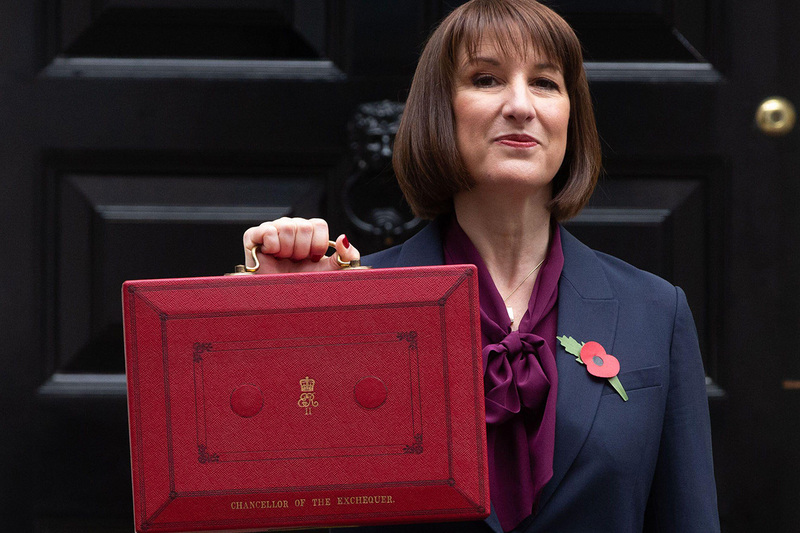You are viewing 1 of your 1 free articles
How recent changes to debt rules could affect the housing sector
The first Labour Budget in 14 years suggested that the chancellor has been listening to the social housing sector. Stephen Delahunty sums up the funding announcements that will have the biggest impact for housing providers
A few months after Labour was resoundingly thrust back into government in July, chancellor Rachel Reeves set out her party’s first Budget in 14 years.
Most of the key housing announcements were trailed before the chancellor delivered her speech in the House of Commons – a speech that suggested Ms Reeves has been listening to the sector and that lays the foundations for further changes to come.
The Conservatives were unsurprisingly quick to decry the Budget as a “borrowing spree”. In the run-up to the fiscal event, Labour sought to pin blame on the previous Conservative government for running the country so poorly that it left a £22bn black hole in the UK’s finances – a mess Labour was going to have to clean up.
At the same time, Labour announced a further £40bn in tax rises and introduced a change in how it measures government debt to allow more spending on infrastructure, while getting debt down as a share of the economy. The Office for Budget Responsibility (OBR) said the change would create £15.7bn of fiscal headroom by 2029-30.
Richard Petty, head of UK residential valuation at JLL, says: “It’s clear that the scale of increase in delivery of new affordable homes requires a corresponding step change in government funding and in private finance,
in some combination.
“The new fiscal rules should provide the key to unlock this vital investment. The chancellor’s announcement is a welcome, if belated, recognition of the true social value of providing high-quality, long-term, affordable homes; and it recognises that the social value translates directly into financial benefits for the public purse.
“However, it is critical that any accounting changes in government do not destabilise the essential and long-established relationship between registered providers and private lenders, who must continue to have confidence that, in the unlikely event of default, they could realise their security in the open market.”
The reclassification of government debt to include financial assets as well as liabilities has yet stirred little debate in the sector, but Peter Freeman, chair of Homes England, has described it as “probably the most important thing in the Budget”.
Key takeaways
First of all, what didn’t go unnoticed? Ms Reeves confirmed a top-up for the Affordable Homes Programme, a five-year rent settlement and Right to Buy reforms, alongside an additional £3bn in guarantees to support small house builders.
There was an extension to the Household Support Fund and an announcement that Discretionary Housing Payments will be extended, with an additional £1bn funding from next year split between the two.
The chancellor revealed a total of £4.4bn in funding for cladding remediation and the government’s Warm Homes Plan, as well as £233m to tackle homelessness and rough sleeping.
There will be an increase in the higher rate of Stamp Duty Land Tax, aimed at helping first-time buyers and targeting those looking to buy second homes, making it more difficult for investors and speculators to expand their property portfolio.
Ms Reeves also promised £1bn in new building safety funding to speed up the removal of dangerous cladding. However, after a week of back and forth between the Treasury and the Ministry of Housing, Communities and Local Government, Inside Housing was able to clarify that while eligibility for existing building safety schemes is unchanged and the criteria remain unchanged, it has not ruled out altering the criteria in future.
Under current rules, social landlords are only eligible for building safety funds if costs would otherwise be passed on to leaseholders or they threaten the landlord’s financial viability.
Different ways to measure debt
Ahead of the Budget, a number of reports suggested that the government was considering a switch to public sector net worth (PSNW) from its current measure of public sector net debt (PSND).
PSNW captures the government’s assets (financial and non-financial) and liabilities. It attempts to provide a broader and more comprehensive picture of the public finances than commonly used measures of debt and borrowing. The main additional assets included are non-financial, including the value of public sector
land and buildings, and housing association stock.
The reclassification of the sector’s assets on the government’s spending plans could be huge. An OBR working paper titled Forecasting the balance sheet: Public sector net worth was released in October 2021.
The report estimates the impact of the reclassification of housing associations into the public sector on the various balance sheet metrics, using the Global Accounts 2015 of English housing associations. PSND deteriorated by £58.4bn, reflecting the loan financing of the sector. However, when the £89.5bn stock of housing assets is included, PSNW improves by £32.7bn – a figure that rises to £90bn using the Global Accounts 2023.
Despite the rumours, Ms Reeves set a slightly less comprehensive measurement for the government’s fiscal target, public sector net financial liabilities (PSNFL), referred to by the government as ‘net financial debt’.
The main additional liabilities accounted for are funded pension schemes and outstanding loans (including student loans) and equity stakes in private companies.

This move brings the UK into line with practices in Germany, France and Japan. While it does not include buildings and housing association assets, it is still intended to free up capacity for public investment.
It is why Mr Freeman told Inside Housing: “You cannot, in a government that has to live short term [and] hand-to-mouth – which it does if it doesn’t put assets on the books – fund things you need that are going to be there for 50 years and probably take 15 years to get there.”
Speaking at the Homes England Investment Symposium a few days after the Budget, Mr Freeman added: “If you don’t release the money to pay for engineers and architects and master planners to start planning something, either you won’t get to spend the capital in five years’ time, or you’ll spend it badly.
“So spending the upfront money, the actual money, to create schemes is absolutely vital. But [so is] recognising their long-term asset value.”
John Guest, partner and head of social housing at audit, tax and consulting firm RSM UK, explains: “The new definition of public sector debt allows the government to include certain assets, such as the treatment of the student loan book as a financial asset.
“Relative to the old definition, this means that headroom is increased, enabling the government to borrow more, and potentially increasing funding to the social housing sector. While the potential for additional funding and investment to the sector would be well received, it would need to be well managed to ensure funding is directed to the right places.
“It also still doesn’t address wider housebuilding capacity challenges within the sector, driven by supply chain issues, availability of land, and slow planning processes. The government’s approach should therefore be balanced, allowing RPs to develop with certainty.”
A long-term trend towards equity finance
Despite the change to the less comprehensive PSNFL, housing consultant and academic Brendan Nevin believes that the government could be signalling a direction of travel towards PSNW that the sector needs to be aware of.
He says: “It wasn’t as significant as if they’d gone with the PSNW model. But it favours equity finance, not grant. And the reason for that is it’s all about liquid assets. If you’ve got a loan, like a Help to Buy loan, which has got a return on it, it goes in as a liability and an asset on the accounts. So it’s actually negative in terms of losing any headroom.
“The issue for housing in that sense is the borrowing potential under the new system is lower than if PSNW had been adopted and this accelerates the shift to equity finance, which has been in the system for quite a while, as more than half of Homes England’s investment is financial instruments or equity or direct investment with a return now.
“This change accelerates that over time. It can only favour investment which produces a return, because that’s the nature of why it doesn’t count against your net debt. It’s both an asset and an investment. So it probably reinforces a shift towards financial instruments and equity investments for housing and further away from grants.”
One example of this in the Budget, Mr Nevin explains, is the fact that the £3bn for small house builders was loans and equity finance, so the amount of new grant announced in the Budget amid all the sector-related announcements was not large.
He adds: “In the short term there is likely to be a larger capital programme and higher grant rates for social housing new build. But the impact of this may be blunted by high levels of inflation in recent years.”
From ‘accountancy wheeze’ to government intervention
Taking a longer-term view, Mr Nevin says it is quite easy to dismiss the current changes as “accountancy wheeze”, but if a crisis developed with private finance because of increasing financial problems in the sector, then interventions at scale could be possible to protect tenants.
“If we were to shift to the PSNW model, the net worth is still positive in the housing association sector and therefore could be refinanced by a shift to public corporation status,” Mr Nevin adds.
Concern for the sector’s financial health was flagged by the English regulator, which recently told Inside Housing’s Regulation and Governance Conference that it is heading towards the same sort of space as the 2008 financial crisis.
Jonathan Walters, deputy chief executive of the Regulator of Social Housing (RSH), said “we’re not there yet”, but there is “no doubt” of the significant financial pressures facing providers.
He referred to the RSH’s latest annual Sector Risk Profile as “25 pages of depression, doom and gloom”. In it, the English regulator reported that the cost of servicing debt exceeded net earnings across the sector for the first time since 2009.
In this sort of scenario, Mr Nevin warns that you could see the government seek control of the sector for strategic reasons relating to a general restructuring of the social sector. “Or beyond this parliament”, he adds. “The government may opportunistically need the value of the assets to support borrowing for investment. There would be no guarantee that investment was reinvested in housing.”
Recent longform articles by Stephen Delahunty
How recent changes to debt rules could affect the housing sector
The first Labour Budget in 14 years suggested that the chancellor has been listening to the social housing sector. Stephen Delahunty sums up the funding announcements that will have the biggest impact for housing providers
How will exemption from the local connection test work?
The government announced it would exempt certain groups from the local connection test when they apply for social housing. Stephen Delahunty finds out what sector figures think is needed for it to work
Sign up for the IH long read bulletin
Already have an account? Click here to manage your newsletters













